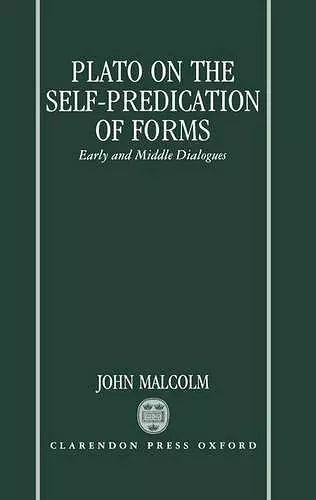Plato on the Self-Predication of Forms
Early and Middle Dialogues
Format:Hardback
Publisher:Oxford University Press
Published:27th Jun '91
Currently unavailable, and unfortunately no date known when it will be back

Much of the recent literature published on Plato's metaphysics has involved the Third Man Argument found in his dialogue Parmenides. This argument depends upon construing Forms both as universals and as paradigm examples, and thus as being subject to self-predication. Professor Malcolm first presents a new and radical interpretation of Plato's earlier dialogues. He argues that the few cases of self-predication contained therein are acceptable simply as statements concerning universals (for example, `beauty is beautiful'), and that therefore Plato is not vulnerable in these cases to the Third Man Argument. In considering the middle dialogues, Professor Malcolm takes a conservative stance, rejecting influential current doctrines which portray the Forms as being not self-predicative. He shows that the middle dialogues do indeed take Forms to be both universals and paradigms, and thus to exemplify themselves. The author goes on to consider why Plato should have been unsuccessful in avoiding self-predication. He shows that Plato's concern to explain how the truths of mathematics can indeed be true played an important role in his postulation of the Form as an Ideal Individual. The author concludes with the claim that reflection on the ambiguity of such notions as the `Standard Yard' may help us to appreciate why Plato failed to distinguish Forms as universals from Forms as paradigm cases.
`He [Malcolm] gives a good account of competing interpretations, and a very defensible view of why it was that Plato was led to write as he did.' Heythrop Journal
`fine book ... His critical analysis of the recent literature on self-predication and his skillful classification of the various interpretative possibilities, which provide the pathway to this goal, constitute a paradigm of Platonic scholarship.' David Keyt, University of Washington, Classical Review (1992)
'a refreshingly philosophical approach to a problem of long standing .. He argues his case well ... this is a significant and useful contribution.' Greece & Rome, April 1993
`The book is elegantly, and ... accurately, produced ... Malcolm displays acuity, pertinacity, and thoroughness; and goes to great lengths to make clear the structure of his argument.' Classical Review
'The auxiliary results of Malcolm's project of understanding Plato's alleged failure are of great interest. The careful, well-grounded examination of others' views ... are illuminating. The ration of telling arguments per page is high. There is much humor in the book, most of it subtle.' Sandra Peterson, University of Minnesota, Philosophical Review, April 1992
'Malcolm has done a great service by providing us with a book we can use for many years as a handbook on modern interpretations of Platonic metaphysics ... the chief value of the book is its thorough discussions of most of the views about Plato's metaphysics that have been proposed in English over the last thirty years.' Paul Woodruff, The University of Texas at Austin, Review of Metaphysics, September 1993
ISBN: 9780198239062
Dimensions: 224mm x 144mm x 19mm
Weight: 442g
238 pages